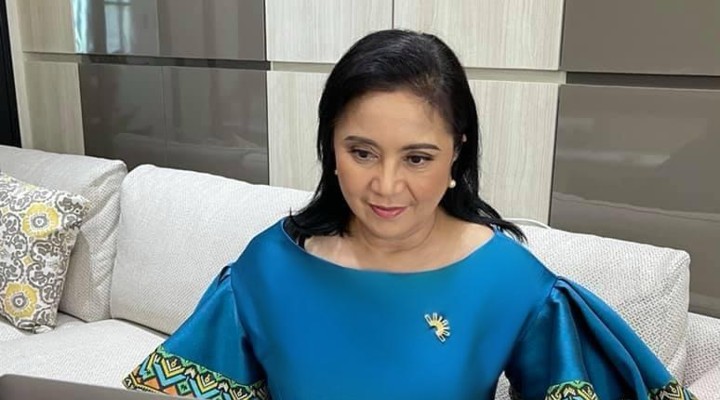In a bid to support the struggling local fashion industry, Philippine vice president Leni Robredo and other politicians proudly wore a newly created golden brooch from the Philippine Fashion Coalition (PFC) at yesterday’s final State of the Nation Address (SONA). Yesterday, the PFC launched a curated tampipi (a big woven gift box) showcasing local products from different regions of the Philippines as part of its Dama Ko Lahi Ko (I feel my culture) campaign. The brooch that the politicians wore
ore at the SONA is part of the collection of gifts.
“It will be like experiencing the different regions in a box,” Jackie Aquino, president of the PFC told Inside Retail. “There will be unique finds from places like Cagayan de Oro, Caraga, Cebu City, Davao, Iloilo, Manila, and Pampanga.”
Proceeds from the purchase of the tampipi will help support businesses in the respective local regions, and fund the other projects the PFC is working on this year.
Strengthening the Filipino fashion industry
The PFC was formed last year at the height of the pandemic in an effort to help the country’s fashion industry survive. Members include fashion designers, events organisers, manufacturers, retailers, and even fashion institutions.
Government reports indicate that the fashion and creative industries are among the hardest hit during the lockdown, with no big gatherings allowed, no live performances, and clothing stores, fashion workshops and factories all shut down.
“We’ve never had a national group for fashion in the history of the Philippines,” said luxury bag and accessories designer and chairperson Carissa Cruz Evangelista. “For us to bring our plans for the fashion industry to fruition, there has to be a unifying force.”
Evangelista added that the PFC aims to not only assist workers in the fashion industry, promote Filipino designers and Filipino culture, but to also be a facilitator and convenor for industry discussions, especially among industry players and stakeholders.
“This includes working towards laws and seeking to enable government policies such as tax breaks, discounts, incentives, regulations, and supporting institutions that create a positive environment for our industry,” she said. “This includes helping create benchmark standards and recommended policies for the entire Philippine fashion industry.”
In 2020, the PFC was able to launch a number of initiatives and fundraising events like the launch of its first brooch, which women of the House of Representatives wore during last year’s SONA.
“It was a show of support to an industry that was really bleeding at that time because nobody was thinking about fashion in the middle of a pandemic,” said PFC board member Carmina Sanchez-Jacob.
“We also started a movement called #FilipinoFashionFridays. We wanted to mark Fridays as ending the week on a positive note by wearing something fashionable and Philippine-made. This grew organically with just us members posting on our Instagram and Facebook pages, and now, celebrities and brands have caught on to it.”
“It’s to strengthen the identity of Filipino fashion and to remind people on a weekly basis that we are still significant at a time that is pretty difficult for all businesses.”
This year, the PFC is working on many of the House and Senate bills involving the development and promotion of the creative industries in the Philippines. Meanwhile, they will continue partnering with Ayala Malls, Shangri-La Plaza and Okada Manila to create pop-up stores within their spaces.

